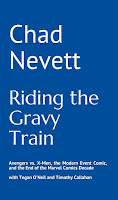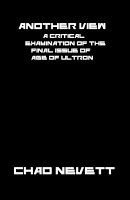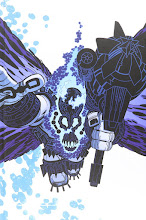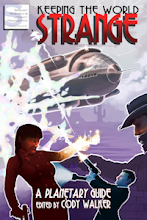Okay, yes, it did.
But.
But.
But, what if it didn’t?
What if the events as depicted in “The God Without Fear,” which ran for three parts in War of the Realms: War Scrolls #1-3, written by Jason Aaron, drawn by Andrea Sorrentino and Matthew Wilson, and lettered by Joe Sabino, only occurred within the mind of Matt Murdock? Setting aside the fact that that is highly unlikely based on the entire history of Marvel and the work of Jason Aaron, let’s walk through this story and see if it did, in fact, occur as presented.
The idea that this story didn’t actually happen first came to me when reading the third part, in the bottom panel of page nine. Daredevil, having used shards of the Bifrost to rescue a bunch of blind children that Malekith kidnapped to draw him out, is depicted lying in a field, arms outstretched, holding the hands of a child on either side whose arms are similarly outstretched to holds the hands of the children next to them. It’s such an odd panel that seems to have little basis in reality. Daredevil rescues the children so they can lie in a field, holding hands? It struck me more as an insight into his mind and the reality that he wished to observe. He equates saving the children, blind like himself, with their being at peace together in a field. It’s not a literal depiction.
And if that panel is not real, what is?
The observer effect is a theory of quantum mechanics in physics where the act of observation alters or impacts that which is being observed. It’s a theory that suggests that things aren’t as isolated as we like to think; that observing and measuring something, usually some small element of reality, affects it because no observation is entirely passive. Daredevil, normally blind, has the ability to see and hear all in this story, having taken Heimdall’s sword to command the Bifrost, which granted him Heimdall’s abilities. So, if Daredevil can see everything everywhere, how does that impact the reality of his own actions and events he’s a part of?
I would argue that the entirety of “The God Without Fear” is Daredevil’s observation of events, altered by his own viewing of them. What we see in the comic is entirely from his perspective. There are two things that support this idea: Daredevil narrates the entire story and the unique artistic by Sorrentino and Wilson that mimics Daredevil’s senses, even when he’s not present, as it does at the end of the first part when Kurse kicks Fisk in the face and there’s an outline box on the impact, coloured differently. It’s inconsistent with the non-Daredevil art and a clue towards what’s actually happening.
The primary conflict of “The God Without Fear” is an internal one. Matt Murdock’s continuing struggles with his faith run up against a new challenge when he becomes a god, or, at least, as close to one as he’s ever encountered. That casts the entire narrative into that set framework of Murdock trying to come to grips with what this means for both himself and the world around him. The narrative is shifted to suit his attempt to use this experience to better understand an unknowable deity whose presence and existence was ingrained into him at a young age.
By observing himself using these powers, Murdock hopes to observe a god in action. If he knows what he is thinking as he acts, and he is able to observe those acts from an external perspective, perhaps new insight is to be gained. In the first part, there is a clear disconnect between Murdock’s internal narration and the actions depicted. When he fights Frost Giants, the art depicts a cacophony of images piled upon one another with various insets and specific focal points, but the narration speaks of everything else that Murdock can see and hear until “I force myself to focus on the rush of icy blood through the arteries of these giants.” Once he focuses in that way, there is no true difference between Daredevil the god and Daredevil the man beyond some additional knowledge. A large depiction of a Frost Giant with a dozen parts isolated with facts provided is not so different from what Daredevil can normally sense in an opponent with his radar senses; the knowledge of the unearthly elements at play is the only addition. He can ‘see’ the various weaknesses and strengths of his opponent like any other time. As such, in the first part of this narrative, he learns very little about what being a god is, except that it’s either an activity in observing all of reality at a remove or it’s exactly like being a person, but with some added information immediately at hand. He’s left somewhat unsatisfied, questioning himself: “[...] but I do not know... if I am truly a god. I just answered the prayers of these people. Isn’t that what a god should do? I have also brought... divine retribution.” Except, in saving some innocents from Frost Giants, did he do anything different from any other night, except perhaps on a different scale?
This pattern continues through the second part. He talks up his powers in his narration, but his actions aren’t much different than normal. He marvels at the power both he and Fisk have at their disposal as they fight, but, aside from that, it’s just another fight between Daredevil and the Kingpin. By the end of the third part, Murdock cannot help but conflate himself with a god, not based on powers, but through his experiences. The added information and perspective gained by his godly powers doesn’t actually change him in any meaningful way. He takes down some thugs in New York, gets into a fight with Wilson Fisk, and saves some kids from a scummy bad guy and his muscle-bound goon before jumping back into another fight in New York. When he goes after Malekith, he narrates, “I used to curse God because I didn’t understand how he could be omnipotent and still let bad things happen to good people. But here I am, a god... doing the very same thing.”
His rescue of the blind children is very much a “Daredevil fight,” as he uses his abilities to his advantage, taking away the moonlight to fight in pitch darkness, and outthinking his opponent. He takes a beating to buy time before he’s able to enact his true plan. He plays to his strengths, fights a boxing strategy, and is able to save the day. At this larger scale of power, it only teaches him one thing: he’s still him, even with godlike powers. And that is the insight that he gains by juxtaposing his own actions with his inner knowledge. The story ends with him looking up at a church in New York and saying, “I’m sorry. About the things I always cursed you for. I didn’t know until now. That you’re just as blind as me.”
In observing himself from an external perspective using his new powers and comparing that to what he was thinking and feeling inside, Murdock learns that the only difference is that of scale. I suppose that is an insight, of sorts, but it’s also a thought exercise that doesn’t actually resolve the conflict he begins with entirely, because it begins from the flawed assumption that additional power is the same as being a god.
The manner in which he defeats Malekith provides another insight that competes with that final moment for being the ‘point’ of the story. The shards of the Bifrost are activated and allow Daredevil and the children to escape only when one of the children touches his sword. He narrates that “what I didn’t expect... was that sometimes more important than salvation... is divine inspiration,” which leads him to conclude, while he lays on the grass with the kids, that “It’s not our gods who give us strength. It’s the other damn way around.” If conflating himself with a god and judging that the only difference is that of scale is simplistic, this is the closest to a profound lesson that he learns and relates to the end of the first part when he spoke of answering prayers. It’s not a new lesson: the god doesn’t matter, it’s the believer. The god is a mirror of the believer, one imbued with an awesome scale of power, one whose whims and directions are merely an attempt to arrange order on the chaos of reality. Of observing the world around you and trying to make sense of it all, changing the unseen things to fit into a nice, neat narrative.
Just as Murdock does for the duration of this story.
There is one glaring argument against this particular reading: Daredevil, throughout the story, cannot actually see Malekith, who uses his magic to avoid detection and observation. In the second part, Daredevil is surprised when Wilson Fisk shows himself in New York, now possessing magical powers from Malekith; in the third part, Daredevil says that he can’t see Malekith until a specific moment, which is part of the Dark Elf’s attempt to entrap the hero. Except, that fits neatly into the narrative that’s presented here; it’s self-sabotage by Daredevil that’s not really in effect. Daredevil conveniently only sees Malekith as he discusses not being able to see Malekith with Heimdall. It fits Malekith into the regular Daredevil narrative where a bad guy has kidnapped some kids and holds them hostage, causing the hero to search for them until, finally, he comes across the trap.
The neatness of the narrative progression is part of what gives this away as a fantasy – or, at least, an edited version of reality. Aside from the present events of the narrative, the first and second parts begin with flashbacks to Daredevil’s past that inform the narrative. The first is an encounter with Thor that introduces the inner conflict between his faith and the existence of the Asgardian gods. He senses tell him that Thor believes himself a god when he calls himself such, which only raises more doubt. The ensuing narrative is Murdock gaining the powers of an Asgardian and learning if that means being a god. Much like the flaw in assuming additional power is the same as being a god, there’s also a flawed assumption in that having the power of an Asgardian is the same thing as being an Asgardian. If Daredevil has the power of Heimdall, is that the same thing as being Heimdall in every aspect? Of course not, because Daredevil continues to behave like Daredevil, not like Heimdall.
The second flashback focuses on the interplay between what is observed externally and what happens internally. Daredevil has caught a serial killer and talks of praying “that once I started beating you, I’d be able to stop,” and, then, admitting that he didn’t kill the man. He muses, “So I suppose God was listening to me that night. Or maybe my arms just got tired,” indicating that even he doesn’t know what happened. He experienced the events and walked away with an ambiguous conclusion of what happened. Perhaps if he had also witnessed those events, he would have gained new insight? Probably not.
If anything “The God Without Fear” is an exercise in solipsism. By simultaneously observing his actions and experiencing them, Murdock makes himself the centre of the universe, the focal point of everything. Everything that happens is fit into a narrative that suits his inner conflict and questions. Reality is remade to revolve around him. He doesn’t recue the children and return them back home; he lies in a field, basking in the glory of being their saviour and the knowledge that he is no different from his God. Even the ‘divine inspiration’ provided by one of the children becomes about him. If anything, this entirely self-centred approach to using his powers and defining his actions provides an unstated insight into the nature of God; one where everything exists and occurs merely as a reflection of His existence. Everything is God experiencing it and observing it simultaneously, fitting it all into a grand narrative of order, just as Matt Murdock does for the entirely of this story.
But, even if this reading of the story is correct, I must admit, that doesn’t mean that the events didn’t actually happen. Aside from that one panel, everything is credible enough. That the events that happen aren’t referenced in any way in War of the Realms does seem suspect, particularly an encounter with Malekith that doesn’t fit neatly into what’s shown in that series. Unfortunately, that isn’t enough to support the argument that the story didn’t happen. Even if the act of observing what happened caused Murdock to unconsciously use his powers to somehow reshape reality into the narrative that we read, that would mean that that is what happened. So, I guess the question that really needs to be asked: how different is “The God Without Fear” from what actually happened?
Only god knows...







